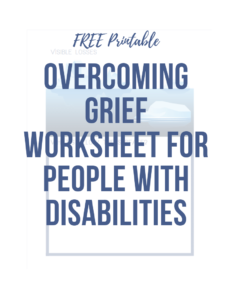If you have recently become disabled, you’ve probably heard this message from your friends, loved ones, and doctors:
“You have so much to be grateful for.”
Don’t be sad, they say. They talk about how much worse things could have been. What if someone wasn’t there, or if you didn’t get treatment when you did? Or what if you didn’t have the great doctors and therapists that you do? Then how much further behind would be you in your recovery?
Your loved ones want you to feel grateful for how good things are. Because they know, and you do too, that things could always be worse.
But, if you’re anything like my counseling clients who have acquired a disability, you might be struggling with grief. As much as you want to accept ‘the new normal’, you’re finding it tough to feel good about how things are now.
What makes it hard to overcome grief after a disability?
In our counseling sessions, my therapy clients who have acquired disabilities are often recovery and rehabilitation oriented. They want to focus on improvement and the future.
But, as much as they want to be positive, they feel very stuck where they’re at right now.
Sometimes they feel overwhelming sadness and anger, and they can’t say where those feelings came from. Sometimes they are crying and they don’t know why they started. They get irritated with their partner over things that they later say really didn’t matter much. My clients find themselves trying to control very minor aspects of their household, even though they tell me in counseling that what they really feel is powerless.
If you have recently become disabled, maybe this sounds like you.
What’s going on?
What makes it hard to be glad for what you’ve got, and to move forward accepting the way things are now? Keep reading to learn my favorite strategy for helping counseling clients overcome grief about their disability (plus a free, printable worksheet that you can use at home).

The iceberg analogy
I sometimes tell my clients that the losses you face after a disability are like an iceberg. Just like the top of an iceberg peeks out over the waves, there are some things you’ve lost that people can see, or that you can easily clue them into.
People can see that an amputee has lost an arm or a leg.
A person with Aphasia can communicate that they struggle with speaking or reading, and so on.
But, we’ve all heard that up to 90% of an iceberg rests below the surface of the water. Invisible unless you know to look for it. But just because you cannot see it, it is large and thus potentially dangerous if you don’t give it due attention.
In many ways, losses due to disability are like an iceberg.
The visible losses are only the tip of the iceberg
There are other deeper, more personal losses under the surface.
A person who has Aphasia may have lost their ability to speak. What else does this loss represent for them?
Perhaps it means they can’t lie in bed at night and joke with their spouse about something that happened that day.
Certainly, they can no longer pick up the phone and call the cable company to make a change to their service.
Perhaps it means that they can no longer work at their job.
I once worked with a client who had Aphasia who was in tears because she couldn’t sing “Happy Birthday” to her cat earlier that morning. She spoke to me through her AAC device:
“I know it’s the silliest thing. It’s a cat’s birthday for goodness sake. But it’s something I’ve done every year with this cat since I got her, ever since I was 20 years old. And now I’ll never do it again. And it’s dumb, but it’s the saddest thing.”
The only way to see an iceberg is to look both above and below the surface at the same time
This is also true when you talk to others, and most importantly, when you talk to yourself, about your disability. You can’t stop by just describing and accepting the visible losses. Those are just the tip of the iceberg.
You must go under the surface, and articulate those losses that might be harder for others to see. That might even be harder for you to accept.
Someone who’s lost their dominant arm can no longer write, wrap their child up in a tight hug, or rock climb. Sure, there is technology that can make all those things possible again. But the person will never again do them with their own body, in the same way that they did before.
It’s OK to be sad about this. It’s normal for your sadness to lead to other, unexpected emotions. There’s no right or wrong way to be sad, and there’s no right amount of time to grieve.
Only by fully exploring your losses, and what they really mean for you, can you ever move past them and reach acceptance.
Here’s a free, printable Iceberg worksheet you can download to map out your own losses. Write those that are visible at the top of the page, and the deeper, harder to see losses at the bottom.
 Summary
Summary
Naming the things you’ve lost is the first step to processing your grief. This is what will allow you to move on and reach a place of acceptance, and ultimately, gratitude for the things that you do have.
If you’ve found this post helpful, please use the social buttons to share it with others who might appreciate it.








